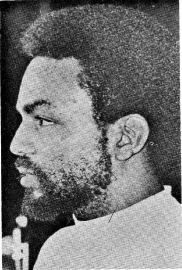Described as “militant” in the press, a 33 year-old barber challenged the incumbent state senator for North Omaha’s 11th legislative district. Decades later, he is one of the most important figures in the history of Nebraska’s legislature, still serving at the age of 81.
Ernie Chambers was already a prominent civil rights activist by the time he ran for Legislature in 1970. In 1964, he petitioned for the removal of the racist story “Little Black Sambo” from Omaha Public Schools.1“‘Sambo’ Book Under Fire Again,” Associated Press, Dec. 12, 1964. In 1966, he appeared in the Oscar-nominated documentary “A Time For Burning.”2“A Time For Burning” | Library of Congress Then-mayor A.V. Sorensen said he would always meet with Chambers, “although he has heaped a lots of abuse on me.”3“Negro Community Has Leadership, But No Consensus,” Omaha Star, Mar. 11, 1966. In 1969, Chambers campaigned for Omaha City Council.4“Chambers To File For City Council,” Omaha Star, Jan. 23, 1969.
George Althouse, a Republican appointed by Governor Norbert Tiemann that year to fill the vacancy created by Sen. Edward Danner’s death, was the incumbent.5“Althouse, Troudt Appointed,” Lincoln Journal, Feb. 20, 1970. Danner, a Democrat,6“State Senator, 2 Other Demos File As Delegates,” Lincoln Star, Feb. 9, 1968. had sponsored several civil rights bills during his time in the Legislature,7“Sen. Danner, 69, Succumbs,” Associated Press, Jan. 27, 1970. including a successful repeal of Nebraska’s interracial marriage ban four years before Loving v. Virginia.8“Interracial Marriage Ban Repeal Bill OKd,” Lincoln Journal, Mar. 27, 1963; “Marriage Bill Hearing Monday,” Lincoln Star, Feb. 24, 1963. Initially, Althouse was not expected to run,9Don Walton, “20 Incumbent Senators Seek Re-Election,” Lincoln Star, Mar. 4, 1970. but ultimately filed for reelection. Chambers filed at the deadline to join Althouse and Michael Adams, grandson of former State Senator John Adams Sr., in the race.10Dick Herman, “Candidates Rush To Beat Deadline,” Lincoln Journal, Mar. 13, 1970. Chambers led the pack in the primary election, with Althouse finishing second and Adams in third. Althouse accused Adams and Chambers’ campaigns of “intimidating” his campaign workers.11“Althouse: ‘Workers Intimidated,'” Lincoln Star, Jun. 16, 1970.
Althouse did not get to officially serve or cast a vote in the Legislature until the special session in June 1970. But with his first floor speech, Althouse had already created controversy. “If it is [God’s] plan that the white man be in command,” Althouse told the Legislature, “there is nothing we can do about it, so let’s all join up and work together.”12“Althouse: Let’s Join And Work Together,” Lincoln Star, Jun. 17, 1970. Marian Danner Williams, the daughter of the late Sen. Edward Danner and a supporter of Chambers, criticized the remarks, saying they depicted God as a racist. Michael Adams accused Althouse of “plantation antics” and said that if he really felt that way, he should resign and hand his seat to “the first white man he can find.”13“Charges Fly In Race For Unicameral Seat,” Associated Press, Jun. 24, 1970. In the narrative of Ernie Chambers’ career this speech is often cited by media as the motivating factor in his run for Legislature.14Nicholas Riccardi, “Term limits will silence speaker of the Senate,” Los Angeles Times, Dec. 24, 2007. But Chambers had been a candidate and already won a primary election before Althouse made the speech. So while it couldn’t have been the reason he decided to run, it may have at least added fuel to the fire.
Chambers himself, of course, was and is no stranger to controversial statements. Arguably, his no-holds-barred rhetoric contributed to his popularity. And he didn’t really care if it jeopardized his political standing. In the case of the death of Omaha Police Officer Larry Minard, Chambers said “he had no tears for the death of his ‘enemy.'”15“Chambers: Won’t Hide For Vote,” Lincoln Journal, Oct. 15, 1970. David Rice and Edward Poindexter, members of the Black Panther Party, were later tried and convicted for Minard’s murder, and became a cause celebre among those who believed that they were framed.16Lori Pilger, “After 45 years in prison, question remains: cop killer or political prisoner?,” Lincoln Journal Star, Dec. 11, 2016.
Chambers was unapologetic about his opinions. “If I am elected to the Unicameral, I don’t want it to be because I disguised what I think.”17“Police Catch Most Of Chambers’ Wrath,” Lincoln Journal, Sep. 22, 1970. He listed some signature issues, including prison reform, that would continue to dominate his legislative career over the decades. Chambers won the election in November, defeating Althouse by a 58-42 margin.18“Election At A Glance,” Lincoln Journal, Nov. 4, 1970. But some observers wondered whether Chambers would be able to work with the predominantly white Nebraska Legislature. He had an answer for them too.
“When I’m dealing with rational-reasonable men, I can be rational and reasonable,” Chambers told the Lincoln Journal. “They’re in for a surprise. Everyone is.”19Dick Mezzy, “Chambers and Althouse Campaign In Controversial Legislative Race,” Lincoln Journal, Oct. 22, 1970.


No matter what you think about him, Sen. Chambers is a major section of Unicameral history all by himself. The footnoted links gave me a jumping-off point to research further in-depth, especially the Minard murder. Thanks for a very interesting read, Dave. Looking forward to future installments.